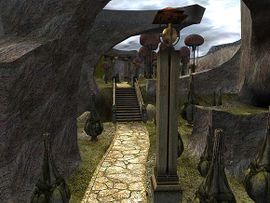Eder Kemo
Eder Kemo is a garden Age that was used by Yeesha and the bahro as part of the Journey. It is the sister Age of Eder Gira.
Appearance
This garden Age is a lush space, enclosed by tall rock walls on all sides. It is segmented into a few separate areas, each of which host different forms of plants and animals. A path winds around the Age in a horseshoe-like shape, leading visitors through each part of the Age before arriving at the linking chamber leading to Eder Gira.
The area closest to the link-in point features a rock pillar at the center of a bowl of grassy terrain. A water fountain on a cement patio stands opposite this pillar. Flowers and thin-trunked trees grow along the path as it wraps around the back side of the Age. A journey door – the first to be discovered by the DRC – is embedded in the far wall of the path. Through a small tunnel, the path opens into a broader field. On one side, fireflies flit through a grove of brain pod trees. On the other is a bunch of hanging grasses, a sculpture that floats and slowly rotates in place, and a small seating area. Large, scorpion-like creatures called keanulints hang over the lip of the garden wall, scratching smaller insects from the rocks for food. Continuing along the other half of the Age's horseshoe path, a grove of fungus-like bulbs spurt puffs of spores into the air. At the end of the path, through another short tunnel, is a small pond with stepping stones that lead into the linking chamber. Kemo fish, the Age's namesake, swim lazily beneath the lily pads on the surface.
Thunderstorms pass through the garden about once every fifteen minutes, but only last for a few minutes. The Age also features a number of paintings in the walls, which are commonly referred to as bahro glyphs, due to their style and depiction of what appear to be events from the bahro's history with the D'ni. More thorough research into these glyphs is ongoing. Additionally, the four-sphere symbol from Ahnonay can also be found throughout Eder Kemo, both in bahro glyphs and on the floor of the gazebos at either end of the garden. However, the relationship between Kadish – Ahnonay's author – and this Age is currently unknown.
D'ni history
Garden Ages such as Eder Kemo were known to have been placed in D'ni neighborhoods throughout the cavern as a way to escape the pressures of everyday D'ni life and get a breath of fresh air. The Age was written around 8100 DE, during a period which the DRC have labeled a "Garden Binge".
DRC history
Explorers got their first glimpse of Eder Kemo in July of 2002, when Rand Miller and Dr. Richard A. Watson took a large group of visitors on a tour of the Age during that year's Mysterium convention.
On September 9th, 2002, Marie Sutherland reported[1] that Restoration Engineer Phil Henderson had gone missing after leaving for Eder Kemo. For the next three weeks, the DRC mounted a search for him. On September 24, 2002, Dr. Watson called off the search after an authorized explorer reported that Phil had spoken to them. He had found a way through Eder Kemo's journey door, and had no intention of returning to his position.
In December of 2003, Phil Henderson returned through the journey door, much to the surprise of Zardoz, an explorer who happened to be in the Age at that time. Since Phil's return, however, little has happened on this Age.
Journey proverb
A notebook provided by Yeesha includes a proverb for each Age in the Journey. Eder Gira and Eder Kemo share the following proverb:
"When all is taken from one, the only hope that remains is what is given by another. Through this giving, both are redeemed." - Regettavok Oorpah; Book 2, Entry 1071, Item 54
